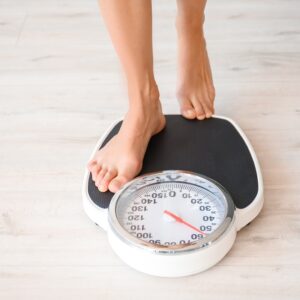How can I calculate my BMR?
Mifflin-St Jeor Equation
| For men |
| BMR (kCal/Day) = 10 x weight (kg) + 6.25 x height (cm) – 5 x age (years) + 5 |
| For women |
| BMR (kCal/Day) = 10 x weight (kg) + 6.25 x height (cm) – 5 x age (years) – 161 |
Harris-Benedict formula
| For men |
| BMR (kCal/Day) = 655 + (9.6 × weight in kg) + (1.8 × height in cm) – (4.7 × age in years) |
| For women |
| BMR (kCal/Day) = 66 + (13.7 × weight in kg) + (5 × height in cm) – (6.8 × age in years) |
What is my average BMR?
Most men have a BMR of about 1,600 to 1,800 kCals a day. Most women have a BMR of 1,550 kCals a day. If you are above 40, your average BMR is probably only 1,200 kCals a day.
What are the causes for BMR variations?
Muscle Mass
Aerobic exercise such as running or cycling has no effect on BMR. However, anaerobic exercise, such as weight-lifting, indirectly leads to a higher BMR because it builds muscle mass, increasing resting energy consumption. The more muscle mass in the physical composition of an individual, the higher the BMR required to sustain their body at a certain level.
Age
The more elderly and limber an individual, the lower their BMR, or the lower the minimum caloric intake required to sustain the functioning of their organs at a certain level.
Genetics
Hereditary traits influence BMR.
Weather
Cold environments raise BMR because of the energy required to create a balanced body temperature. Likewise, too much external heat can raise BMR as the body expends energy to cool off internal organs. BMR increases approximately 7% for every increase of 1.36 degrees Fahrenheit in the body’s internal temperature.
Diet
Small, routinely dispersed meals increase BMR. On the other hand, starvation can reduce BMR by as much as 30%. A human body will make sacrifices such as energy levels, moods, upkeep of bodily physique, and brain functions in order to more efficiently utilize what little caloric energy is being used to sustain it.
Pregnancy
Ensuring the livelihood of a separate fetus internally increases BMR. This is why pregnant women tend to eat more than usual. Also, menopause can increase or decrease BMR depending on hormonal changes.
Supplements
Certain supplements or drugs raise BMR.
Fever
Temporarily increases BMR.
Hyperthyroidism (Increased Thyroid production)
Leads to high BMR because thyroid hormones play an important role to regulate your metabolism. Alternatively, low thyroid production causes low BMR. Cancer can also cause high BMR due to high metabolic activity by the cancer cells in the body.
What are my risks of having altered BMR?
If you have a fast metabolism, you’ll have individuals who are thin despite eating huge amounts of foods. People with a slower metabolic rate tend to gain weight in areas such as the inside of the abdomen, around the organs, in the liver — this type of weight gain is associated with diseases like diabetes, high blood pressure, heart disease, stroke and a lot of other health consequences.
How to avoid effects of slow metabolism?
- Eat healthy foods that have lots of fiber, and fruits and vegetables.
- Stay away from saturated fats and simple carbohydrates such as processed or refined sugars.
- Eat lean proteins.
- Space out your calories throughout the day with smaller meals and healthy snacks so your body will consume more energy.
- Eating only one meal could cause your body to go into starvation mode and hang on to every calorie you eat.
- Hydration is important to digest and use those calories. The more water you drink, the more urine you make, the more calories you burn.
- Drink green tea. Studies have found green tea contains a compound called epigallocatechin gallate, which boosts metabolism.
- Stress and too little sleep slows down your metabolic rate. Reducing stress and adequate sleep is thus essential.
- These are some exercises you can do to increase your BMR:
-
- Increase your workout with weights: Studies have shown that you can increase your BMR by as much as 7% after several weeks of weight workouts.
- Mix cardio exercises and weights: If you mix these up in the same exercise session, you will burn more calories because your oxygen uptake is increased.
- Do interval training: If you do sprint interval training (for two minutes), studies have shown that this is equivalent to a 30- minute endurance training.







